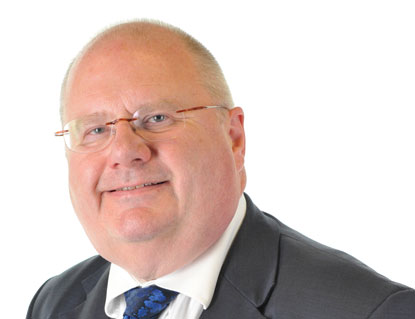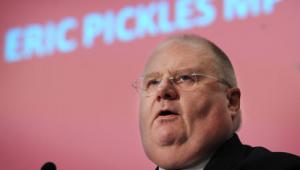By Richard Johnstone | 6 December 2012
Local Government Secretary Eric Pickles has accused some councils of scaremongering about funding cuts after it was revealed that town hall reserves have risen by more than a third in the past five years.
 An analysis of council funding by the Audit Commission, published today, found that local government reserves totalled £12.9bn at the end of 2011/12, equivalent to almost a third of net spending on services. Reserves increased by £4.5bn between 2007 and 2012.
An analysis of council funding by the Audit Commission, published today, found that local government reserves totalled £12.9bn at the end of 2011/12, equivalent to almost a third of net spending on services. Reserves increased by £4.5bn between 2007 and 2012.
The watchdog urged councils to ‘strike a balance’ between current and future needs and said they should provide greater detail on how their reserves could be used.
Pickles said: ‘People would be surprised that councils are hoarding billions whilst some are pleading poverty.’
Given the rise in reserves, it was ‘disappointing and irresponsible that some sections of local government have chosen to needlessly scare the public with unfounded predictions of doom and gloom’, he added.
‘Whilst local authorities should maintain a healthy cushion, it's time for them to tap into their substantial reserves to ensure they protect frontline services, with a view to building up their reserves again in sunnier days to come.’
The watchdog’s Striking a balance report found that £9.9bn of the total had been earmarked for specific purposes. However, it stated this did not mean there was always a confirmed plan for spending the funds.
Councils should provide greater details on their plans for the reserves, the report said. Although authorities routinely consider the role of reserves in annual budget setting, they should also give councillors clearer and more comprehensive advice on how they could be used.
Many authorities had set money aside to prepare for possible funding reductions and to deal with uncertainty arising from local government finance reforms, the auditors said.
However, some growth had been unplanned. It was therefore ‘essential’ that councils reviewed their reserves frequently to ensure their plans reflected both the risk of future financial shocks and long-term spending proposals.
Audit Commission chair Jeremy Newman said reserves formed ‘a vital element of good financial management for any council, especially at a time of financial uncertainty’.
However, authorities had to ensure they struck ‘a balance between the needs of current and future taxpayers’, he added.
‘Given the sums involved, and the risks, it is essential that councils’ decisions are made openly and reported with clarity, so local taxpayers and service users can hold their councils to account.’
The report found that between 2007 and 2012, 77% of all councils increased their reserves relative to their spending, although this period included the first year of cuts following the Comprehensive Spending Review in October 2010.
Responding to the commission, the Local Government Association said councils had been ‘prudent’ in putting money aside, both as part of future investment plans, and to save for a rainy day.
LGA chair Sir Merrick Cockell said the ‘entirely justified’ increases in reserves were designed to help councils manage ‘the significant and growing financial risks to vital local services’.
The savings were ‘absolutely essential’ to cover the threat of any unexpected cuts to funding, he added, such as the additional 2% reduction in 2014/15 announced by Chancellor George Osborne in yesterday's Autumn Statement.
CIPFA said that council reserves were ‘an important component’ of financial planning by authorities.
There were risks associated with drawing down reserves to close funding gaps, the institute stated, adding that the nature of most council services meant that they required recurring funding to meet staff and other running costs year after year, whereas reserves were a one-off and finite source.
Chief executive Steve Freer said: ‘We have to be extremely careful about using one-off reserves to fund shortfalls in recurring funding. Reserves are not a long-term solution.
‘At best they buy time to enable service changes to be planned and implemented in an orderly way. In these circumstances, it is important that councils explain clearly to the public the actions and implications for services which are expected to follow in the medium and longer term.’



Local Government Secretary Eric Pickles has accused some councils of scaremongering about funding cuts after it was revealed that town hall reserves have risen by more than a third in the past five years.
 An analysis of council funding by the Audit Commission, published today, found that local government reserves totalled £12.9bn at the end of 2011/12, equivalent to almost a third of net spending on services. Reserves increased by £4.5bn between 2007 and 2012.
An analysis of council funding by the Audit Commission, published today, found that local government reserves totalled £12.9bn at the end of 2011/12, equivalent to almost a third of net spending on services. Reserves increased by £4.5bn between 2007 and 2012.The watchdog urged councils to ‘strike a balance’ between current and future needs and said they should provide greater detail on how their reserves could be used.
Pickles said: ‘People would be surprised that councils are hoarding billions whilst some are pleading poverty.’
Given the rise in reserves, it was ‘disappointing and irresponsible that some sections of local government have chosen to needlessly scare the public with unfounded predictions of doom and gloom’, he added.
‘Whilst local authorities should maintain a healthy cushion, it's time for them to tap into their substantial reserves to ensure they protect frontline services, with a view to building up their reserves again in sunnier days to come.’
The watchdog’s Striking a balance report found that £9.9bn of the total had been earmarked for specific purposes. However, it stated this did not mean there was always a confirmed plan for spending the funds.
Councils should provide greater details on their plans for the reserves, the report said. Although authorities routinely consider the role of reserves in annual budget setting, they should also give councillors clearer and more comprehensive advice on how they could be used.
Many authorities had set money aside to prepare for possible funding reductions and to deal with uncertainty arising from local government finance reforms, the auditors said.
However, some growth had been unplanned. It was therefore ‘essential’ that councils reviewed their reserves frequently to ensure their plans reflected both the risk of future financial shocks and long-term spending proposals.
Audit Commission chair Jeremy Newman said reserves formed ‘a vital element of good financial management for any council, especially at a time of financial uncertainty’.
However, authorities had to ensure they struck ‘a balance between the needs of current and future taxpayers’, he added.
‘Given the sums involved, and the risks, it is essential that councils’ decisions are made openly and reported with clarity, so local taxpayers and service users can hold their councils to account.’
The report found that between 2007 and 2012, 77% of all councils increased their reserves relative to their spending, although this period included the first year of cuts following the Comprehensive Spending Review in October 2010.
Responding to the commission, the Local Government Association said councils had been ‘prudent’ in putting money aside, both as part of future investment plans, and to save for a rainy day.
LGA chair Sir Merrick Cockell said the ‘entirely justified’ increases in reserves were designed to help councils manage ‘the significant and growing financial risks to vital local services’.
The savings were ‘absolutely essential’ to cover the threat of any unexpected cuts to funding, he added, such as the additional 2% reduction in 2014/15 announced by Chancellor George Osborne in yesterday's Autumn Statement.
CIPFA said that council reserves were ‘an important component’ of financial planning by authorities.
There were risks associated with drawing down reserves to close funding gaps, the institute stated, adding that the nature of most council services meant that they required recurring funding to meet staff and other running costs year after year, whereas reserves were a one-off and finite source.
Chief executive Steve Freer said: ‘We have to be extremely careful about using one-off reserves to fund shortfalls in recurring funding. Reserves are not a long-term solution.
‘At best they buy time to enable service changes to be planned and implemented in an orderly way. In these circumstances, it is important that councils explain clearly to the public the actions and implications for services which are expected to follow in the medium and longer term.’





















